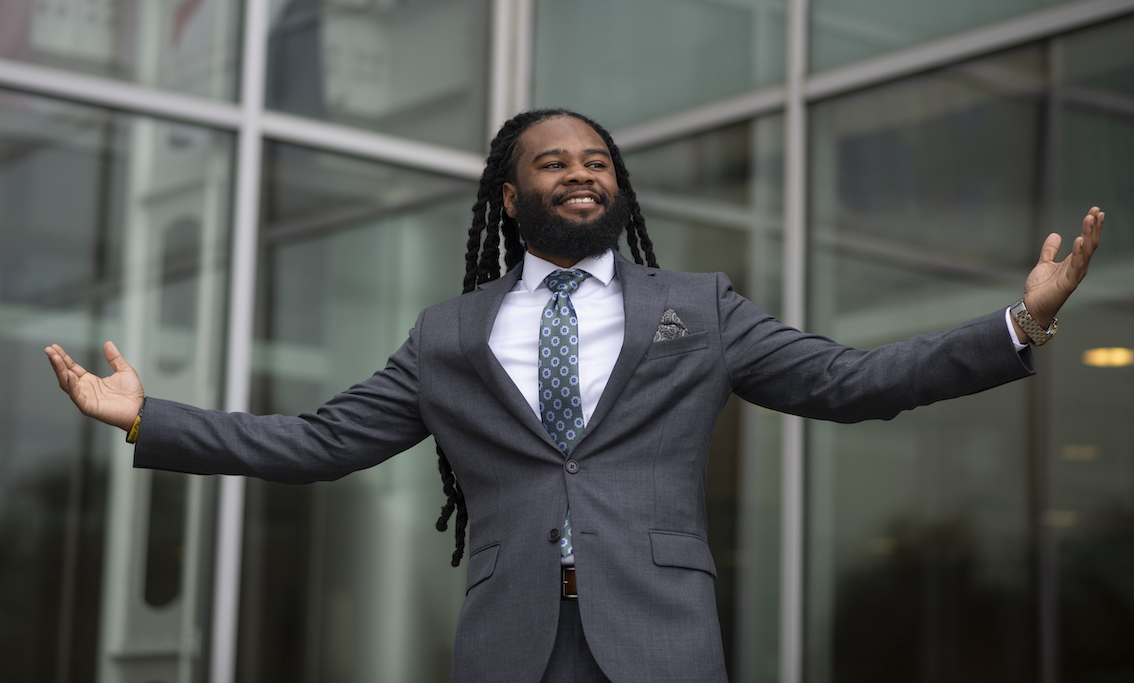
For students whose coursework required hands-on experience, the COVID-19 pandemic created challenging and, in some cases, unique hurdles.
Consider Malik McCoy, who during the fall 2020 semester was just beginning his master’s studies in athletic training at George Mason University. With all courses online, he had to learn taping and wrapping techniques in a virtual class.
“But we made it work,” McCoy said. “The staff did a good job to make things work out.”
McCoy can laugh about it now as he prepares to graduate with the admiration of the coaches and athletes with whom he worked and the Mason faculty members with whom he interacted.
“I did have a great experience,” McCoy said. “The connections I made during my time here, and going to different schools and meeting new people, was great.”
McCoy, who is from Portsmouth, Virginia, came to Mason from Norfolk State University, where he earned a bachelor’s degree in exercise science with a concentration in kinesiotherapy.
But conversations with his Norfolk State advisor, herself a former athletic trainer, gave McCoy the bug.
As a sophomore he introduced himself to the athletic training staff, which allowed him to help out as a student aide. By his senior year, he was traveling with the football team. He chose Mason to pursue his master’s after attending an orientation.
“I fell in love with the staff and faculty,” he said. “It just felt like my new home.”
At Mason, McCoy has done clinical training at one college and two high schools, helping his preceptors deal with ankle sprains, dislocations and even a spinal cord injury.
“His professionalism was top notch,” said Brandon Holland, a certified athletic trainer for Prince William County Schools and McCoy’s preceptor at C. D. Hylton High School in Woodbridge, Virginia. “He built a great rapport with the student-athletes. He built a great rapport with the coaches to the point they were sad to see him go.”
In addition, Holland said, “He asked a lot of questions, which is great. A lot of young people are afraid to ask questions. What he didn’t know he actively pursued knowledge on, and if there was something he needed to make an adjustment with, he would rehearse it until it became second nature.”
Still, it hasn’t been easy for McCoy, who is working several jobs to get through college: part time as a customer service representative at the Department of Motor Vehicles in Virginia, and full time as a driver rehabilitation specialist, training those with autism how to safely operate a motor vehicle. He also trains those who require adaptive equipment to operate a motor vehicle because of a physical disability.
McCoy agreed that balancing his workload with his coursework while maintaining a healthy lifestyle has been challenging, but worth it.
“I love helping others and giving back, especially when an athlete is injured,” he said. “Making that one-on-one connection with them, and making them feel better. Just seeing the smiles on their faces when they’re out there playing is so rewarding.”
McCoy said he’d ultimately like to work for a professional sports team or as an athletic trainer at NASA’s Astronaut Strength, Conditioning and Rehabilitation Group.
For now, though, “I’m just looking forward to the day,” he said of graduation. “I can make my mother, my family, and friends proud. I just want to see their smiling faces as I walk across the stage.”
